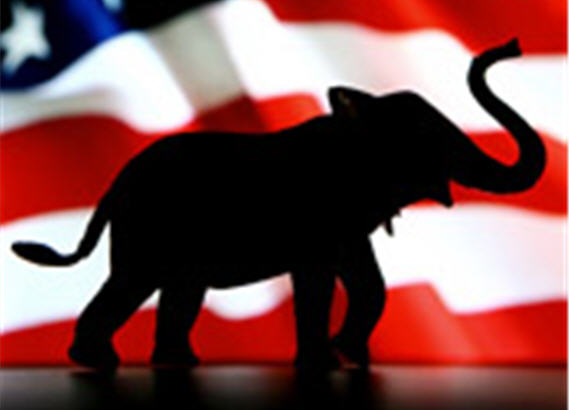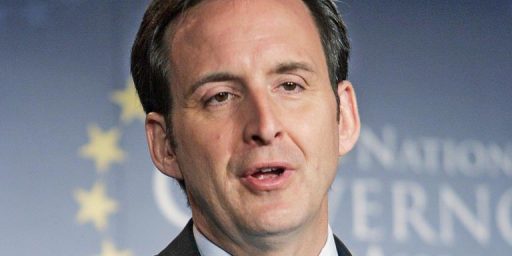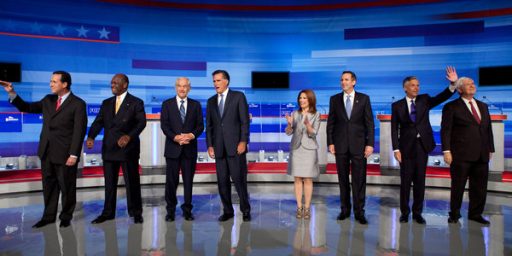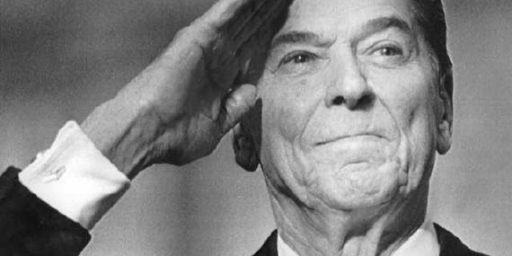Republican Party Politics And The Isolationist Canard
A few Republicans have picked up on John McCain's criticism of critics of the Libya mission as being "isolationist."
John McCain’s criticism of Republicans who have dared to question things like the U.S. mission in Libya and the seemingly unending war in Afghanistan has been picked up by at least two of the Republicans running for President. First, Tim Pawlenty, who strikes me as a man desperately trying to gain attention inside the party at this point, expressed concern about the drift of his party in an interview given before President Obama’s speech yesterday:
On the eve of President Barack Obama’s speech announcing a troop drawdown, Tim Pawlenty cautioned the GOP Tuesday against going wobbly on Afghanistan.
“I don’t like the drift of the Republican Party toward what appears to be a retreat or a move more towards isolationism,” the former Minnesota governor told POLITICO reporters in an interview.
(…)
In an hourlong interview, Pawlenty took a hawkish position at a time when prominent Republicans have publicly called for significant troop reductions and polls have shown increasing doubt among GOP voters that the conflict can be won.
Michelle Bachmann, meanwhile, seemed to step back from her recent critical comments about Afghanistan and is now firmly in the neo-con camp:
In Afghanistan, we are making great progress. We have to win southern Afghanistan, then we have to go on and win eastern Afghanistan. I believe that we will be victorious, and we’ll end it. I understand why people are frustrated. I completely understand. But I do trust General Petraeus in that effort and in what he is doing over there. And I think that they are doing what we need to do.
Ron Paul, meanwhile, took a swipe at both Pawlenty and McCain, pointing out in an interview that the policy positions they were complaining about are nothing close to “isolationism”:
Paul swatted aside the critique of fellow presidential contender Tim Pawlenty, who said that he fears the GOP field is moving toward “isolationism” in wanting a swift withdrawal out of Afghanistan, and an end to hostilities in Libya.
“I think they don’t know the definition of isolationism,” Paul responded. “Isolationism is — is something that the protectionists want. They want to close borders for people coming in, and they want to close trade, and I have no desire to do that all, because I’m a free trader and I want as much travel and communication with other countries as possible. This is what the Founders advised. We were never given the authority to be the policemen of the world.”
So, it looks like there’s a real debate developing among Republican about the proper course to go on foreign policy. On one side, there’s the group who wants to continue the foreign policy of the Bush era, and seems to believe that there isn’t a country on the planet that we shouldn’t intervene in if the opportunity arises. They oppose the action in Libya, for example, not because they don’t believe that there are any American national interests implicated there, but because they think President Obama is being too timid and that we should be unleashing the U.S. military in an all out bid to depose Qaddaffi. On other side, there’s the group who McCain and other are smearing with the “isolationist” moniker. To them, the foreign policy of the Bush and Obama era has been far too adventurous and far too expensive and that the United States needs to return to the day when we acted solely in our national interests, and not as the policeman of the world.
There are some who are unconvinced that the dispute is real, such as Jonathan Chait:
It’s true that some Republicans are sounding anti-interventionist notes now. George W. Bush himself ran in 2000 as an anti-interventionist, attacking the Clinton administration for its nation-building and promising a more “humble” foreign policy. The Republican fear of reckless American intervention disappeared as soon as Clinton did, and it will disappear again as soon as a Republican takes the oath of office.
Chaist does have a point. As I’ve said before there are no doubt many Republicans criticizing the aggressiveness of President Obama’s actions in Libya and Afghanistan who would be silent if those decisions were being made by President McCain. Nonetheless, there are clearly other Republican politicians out there who, motivated in part by the nations focus on economic and fiscal troubles, have come to realize that endless overseas military adventurism simply isn’t an option anymore and that the United States needs to take a more realistic view when it comes to foreign policy. There are differences, for example, in the foreign policy statements coming from Mitt Romney or Jon Hunstman, and those coming from the campaigns of Tim Pawlenty and Michele Bachmann. In the Senate, there is a great difference between Rand Paul and Marco Rubio. As Daniel Larison put, the Libya mission has opened up a fissure in the GOP that seems very real:
The illegal, ill-defined mission in Libya has opened a large fissure in the Republican Party on foreign policy — a split that was clear even before the House voted on two Libya resolutions Friday. The split has also affected the party’s field of 2012 presidential candidates, as four likely or declared candidates have come out in opposition to intervention in Libya, and several have also voiced strong opposition to a continued U.S. military presence in Afghanistan.
While the party continues to be guided and led by hawks, there is increasing skepticism of the wisdom of military intervention, and once again a growing conviction on the Right that America cannot afford — and should not try — to police the globe. Perhaps more important, after a decade of acquiescing to outrageous executive power-grabs in the name of national security, many Republicans appear to have reached their limit, after President Obama launched a war entirely on his own authority. The votes in the House last week were proof of this.
Moreover, its significant that this ongoing shift inside the GOP mirrors changes in public opinion that have developed the longer that the culture of perpetual war as tried to assert itself:
A 2009 poll (.pdf) asking Americans whether the United States should “mind its own business” internationally produced a 40-year high “yes” response of 49 percent. (That figure dropped slightly this year to 46 percent (.pdf).
A recent poll of young leaders (.pdf) conducted by the Brookings Institution found that nearly 58 percent of respondents agreed that “The U.S. is too involved in global affairs and should focus on more issues at home,” while only 10 percent thought that the United States should be more involved globally.
In a recent poll of Americans’ views on how to deal with the long-term national debt, 65 percent of respondents, including 56 percent of Republicans, favored “reducing overseas military commitments” to help close the fiscal gap. In the same poll, 58 percent said the United States needs to “concentrate on problems at home” as opposed to those abroad.
In short, the public is significantly less interventionist than the bipartisan foreign-policy elite in Washington.
Or, as George Will put it today:
Last Sunday on ABC’s “This Week,” McCain warned that the GOP has always had “an isolation strain.” He calls it “the Pat Buchanan wing,” which he contrasts with “the Republican Party that has been willing to stand up for freedom for people all over the world.” Rather a lot turns on the meaning of “stand up for.”
Between wishing success to people fighting for freedom and sending in the Marines (or the drones), there is as much middle ground for temperate people as there is between Buchanan, a sort of come-home-America conservative, and McCain, a promiscuous interventionist. When asked his response to those, including Defense Secretary Robert Gates, who say there was no vital U.S. interest at stake when the Libya intervention began, McCain said: “Our interests are our values” and “our values are that we don’t want people needlessly slaughtered by the thousands,” as Moammar Gaddafi seemed to threaten to do, “if we can prevent such activity.” Under the McCain Doctrine, America’s military would have just begun to fight, and would never stop.
Americans are, however, war weary — which is a good thing: What kind of people would they be if they were not? U.S. involvement in the Second World War lasted 1,346 days. U.S. fighting in Afghanistan reached that milestone six years ago (June 14, 2005). America is fighting there, in Iraq, in western Pakistan, in Yemen and in Libya. Where next? Under the McCain Doctrine, wherever U.S. “values” are affronted — and those who demur from this global crusade are isolationists, akin to those who, 70 years ago, thought broad oceans and placid neighbors guaranteed America’s security from Hitler and Japan.
(…)
McCain, however, says we must achieve regime change in Libya because if Gaddafi survives, he will try to “harm” America. This is always the last argument for pressing on with imprudent interventions (see Vietnam, circa 1969): We must continue fighting because we started fighting.
The fact that this is the argument that McCain, Pawlenty, and Senator Lindsey Graham (among others) are resorting to indicates that they really don’t have a response to concerns raised by non-interventionists and foreign policy realists who wonder whether all this expenditure of American blood and treasure is really worth it. So yes, Jonathan Chait is right that there’s a political component to the debate that’s going on inside the GOP, but this is Washington where everything is immersed in politics in one way or another. The debate itself, though, is a valuable and important one and the future of the nation could very well hinge on the outcome.






